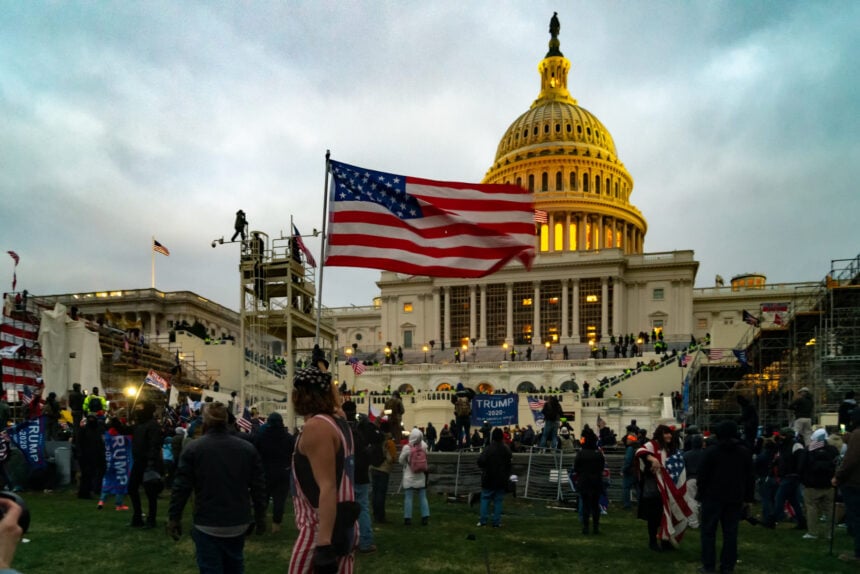This is the fifth article in a five-part series on Christian Nationalism. Following are links to the other parts: One, Two, Three, Four.
I’ve been both a right-winger and a believer
my whole life. I’ve always known the “separation of church and state” is fake—all politics is in the end theological. I have no special pride in my consistency or shame in my inertia. It’s just a fact—I’m a nationalist Christian and always have been.
But I’ve never called myself or been called a Christian nationalist, at least not until 2021. Isn’t that funny? My political stripes haven’t changed in 34 years, and I know many who share my views and have lived twice as long. But never in our lives were we called “Christian nationalists.”
After January 2021, all of a sudden the term was everywhere, especially in the corporate media, which wielded it to coordinate attacks on multiple targets: patriotism, faith, social conservatism, and grassroots activism. Best of all, the term bore a pseudo-academic patina and enabled liberal theologians to write a flurry of tracts against it.
Smear words that become common parlance in media and academia are rarely organic: they are a venerable form of propaganda. Calling an opponent of war an “isolationist” is one example. The word contains an element of truth but creates connotations that place its target in the worst possible light: isolated and alone, cut off from friends.
I smelled a similar psychological operation around Christian nationalism, and decided to research the origins of the term and figure out why it was suddenly catching on like wildfire. Christian nationalism has been periodically summoned by the left as a bogeyman for at least the last 15 years, one example being the 2008 documentary American Crusaders: The Rise of Christian Nationalism in Post 9/11 America. I believe that the current Christian nationalism propaganda campaign launched just after the events at the Capitol in Washington, D.C., on Jan. 6, 2021. Following that debacle, the concept of Christian nationalism started to appear, seemingly propagated by the right, but media coverage of it appeared coordinated and followed the conventional patterns of the left’s control apparatus.
Soon after the events at the Capitol, the Baptist Joint Committee for Religious Liberty (BJCRL) published a hand-wringing report about the danger of Christians who use religious imagery as part of their political activity. The report was covered by several mainstream news outlets.
So-called moderate conservatives played their part as well. National Review published several articles about Christian nationalism, including some that compared it to the anti-Semitic group called the Christian Nationalist Crusade, founded in 1942 in St. Louis. Plenty of Never Trump pundits gleefully shared the BJCRL report and began using the Christian Nationalist term. Liberal Christians were used to this game already: they participated in the “Islamophobia” campaign of the early 2000s, smearing anyone who advocated more thorough vetting for travelers from the Middle East as Islamophobic.
So who is ultimately behind the Christian nationalism smear campaign? It’s fruitless to speculate based simply on cui bono, because the entire ruling class would stand to benefit. With politically active Christians and the Republican grassroots out of the way, it can continue shutdowns and mandates, election rigging, mass surveillance, criminal takeovers of our cities, and the corruption of our justice system. Anyone with a stake in this regime benefits from harming patriotic Christians.
But then why are Christians using the term? Books published this year, like Stephen Wolfe’s The Case for Christian Nationalism and Gab.com Chief Executive Andrew Torba’s Christian Nationalism: A Biblical Guide For Taking Dominion And Discipling Nations are, I’m sure, very interesting explorations of the church-state relationship from what has traditionally been called by Protestants a “papocaesarist” perspective.
My concern, however, is that the term “Christian nationalism,” has been for some years a trigger word for the average American, whose sensibilities are informed primarily by the media. Of course, embracing the smear terms meant to discredit one’s side is a deeply American tradition, from “Yankee Doodle” to “Deplorable.” And it’s often effective. I don’t know enough to predict who will win the battle over the Christian nationalism moniker, but we must admit the left is deviously good at controlling language.
Christians should not fear to hold nationalistic political views, nor do those views contradict our Christian traditions. But we must be careful not to lose sight of the difference between faith and politics. And we also must be aware that the leftist psyop behind Christian nationalism, and the right’s reaction to that campaign, is about connotation and persuasion—not about truth. We should think carefully before we adopt the left’s smear words for ourselves.



Leave a Reply